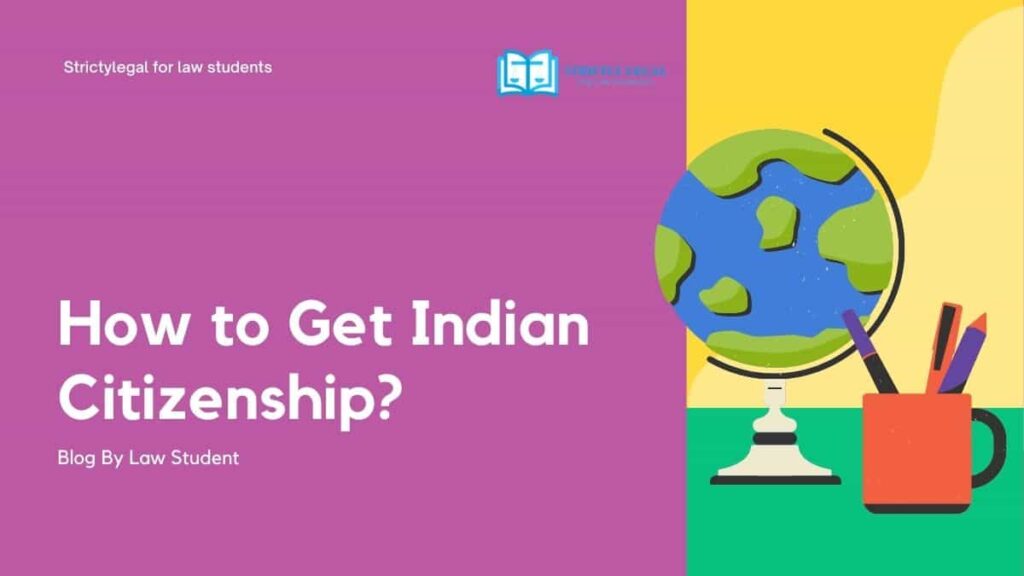India has its own legislation that governs its citizenship laws namely the citizenship Act, 1955 specifically and the constitution of India. But before we move ahead to learn about the provisions of law under the Citizenship Act, 1955 let us understand what the constitution states on who are citizens of India?
Table of Contents
The Constitution on Who are Citizens of India?
The Constitution of India in its Part II i.e under the chapter of Citizenships lays down the provisions herein stated:
Article 5 of the Constitution states that at the commencement of the constitution, any person domiciled within the territory of India and
- Was Born within the territory of India, Or
- Either whose parents were born within the territory of India, or
- Who has been ordinarily residing within the territory five years immediately preceding 5 years from the commencement of the constitution
Shall be a Citizen of India.
Certain Rights to Citizens who have migrated from Pakistan
The non-obstante clause in Article 6 of the Constitution states that people who have migrated from Pakistan to India shall also be deemed to be citizens of India only if certain criteria are met as has been listed in the article. You can read it here: Article 6
Methods of Acquiring Citizenship in India
There are basically 5 ways of acquiring citizenship in India and each of them has been enumerated below:
Citizenship by Birth
Section 5(1)(c) of the Citizenship Act, 1955 states that a person born in India on or after the 26th day of January 1950, but before the 1st day of July 1987, is a citizen of India by birth. It is called jus soli (right of soil).
A person born in India on or after the 1st day of July 1987 but before the commencement of the Citizenship (Amendment) Act, 2003 is a citizen of India if either of his parents is a citizen of India at the time of his birth.
By Descent
By Descent: Section 3(1) of the Citizenship Act, 1955 states that every person born outside India shall be deemed to be a citizen of India if his father is a citizen at the time of his birth. However, this provision shall not apply to persons who or either of whose father or grandfather were ordinarily resident in Pakistan immediately before 19th July 1948.
It should be noted that after the 2003 amendment of the Citizenship Act, the government stated that a child born shall not be Indian merely because of his descent but has to be registered with due process within 1 year of its birth to gain Indian Citizenship.
By Registration
Who are citizens By Registration?
A person of Indian origin who is ordinarily resident in any country or place outside undivided India, shall be eligible for registration as a citizen of India if he has been registered as an overseas citizen of India for five years and has resided in India during the period of twelve months immediately preceding the date of application.
The Central Government may, on an application made in this behalf, register a person as a citizen of India if he belongs to any of the following categories:
(a) a person of full age and capacity whose parents are registered as overseas citizens of India;
(b) a person of full age and capacity who is married to a citizen of India and is ordinarily resident in India for seven years before making an application for registration;
(c) Minor children of persons who are citizens of India;
(d) Minor children, where one parent is a citizen of India;
(e) A person registered as an overseas citizen of India for five years and residing in any country or place outside the territories to which the Citizenship Act, 1955 extends.
By Naturalization
Citizenship by naturalization is the process by which a non-citizen may acquire citizenship or nationality of that country. It may be done by a statute, without any effort on the part of the individual, or it may involve an application or other procedure.
In most cases, an applicant for naturalization is a permanent resident who has lived in a country for the statutory period (usually three to five years) and satisfies certain other requirements. To be eligible for naturalization, a person typically must:
- Be at least 18 years old and have five years of permanent residence in India
- Be able to read, write, and speak basic English or Hind or any of the languages listed in the eighth schedule of the Indian Constitution;
- Have an attachment to the Constitution and principles of socialism, secularism, and democracy
- Have a good moral character
- Take an oath of allegiance to India
It should be noted that if a person has made significant contributions in the field of arts, science, commerce, literature, human progress etc he may be admitted as a citizen waiving the conditions given in the third schedule of the Act.
By Acquisition or Incorporation of Territory
If any territory is acquired by the state then it becomes a part of India and hence all the citizens of that territory shall be citizens of India. For example, Many territories because part of India like Goa, Sikkim, Puducherry, Daman and Diu and the citizens of these territories are now Indian citizens.
Other FAQ
Any person can be a citizen of India in any of the 5 ways namely 1. By Birth 2. By descent 3. By Acquisition of territory 4. By Naturalisation 5. By Registration
The constitution of India does not allow dual citizenship and it bars its citizens from acquiring foreign citizenship.
Yes, only if their parents or grandparents are either born in India or citizens of India a baby born in the US is entitled to citizenship of India.

Passionate about using the law to make a difference in people’s lives. An Advocate by profession.




